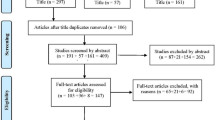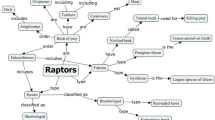Abstract
The purpose of this study was to examine relationships between structural characteristics of students' concept maps about chemical equilibrium and independent measures of their achievement in chemistry. Fifty students in 1991 and seventy students in 1992 completed a concept-mapping task using twenty-four specified concepts. Using similarities in concept map structure, based on the presence or absence of linked pairs of concepts, non-metric multidimensional scaling (MDS) was used to plot the location of the concept maps in coordinate space. The distribution of maps was based on differences in their structure, but also reflected levels of student achievement on independent tests. The relationship between the coordinate location of each student's maps and his or her test scores on independent chemistry achievement tests was sought by canonical correlation analysis of the 1991 data set. This revealed significant relationships between the MDS coordinates and test scores of recall of knowledge and its application. Multiple regression analysis of sixty-one students' maps from the 1992 data set against their percentile rank scores on a national chemistry quiz revealed significant relationships. The results are interpreted as revealing structural differences in conceptual organisation about chemical equilibrium among students with different levels of achievement and thus relative expertise in the domain. The significant relationship between map structure and cognitive process scores in chemistry also supports the view that the organisation of declarative knowledge influences its accessibility in cognitive tasks.
Similar content being viewed by others
References
Anderson, J. R. (1982). Acquisition of cognitive skill.Psychological Review, 89, 369–406.
Anderson, J. R. (1987). Methodologies for studying human knowledge.Behavioural and Brain Sciences, 10, 467–505.
Anderson, O. R., & Demetrius, O. J. (1993). A flow-map method of representing cognitive structure based on respondent's narrative using science content.Journal of Research in Science Teaching, 30, 953–969.
Bereiter, C. (1992). Referent-centred and problem-centred knowledge: Elements of an educational epistemology.Interchange, 23/24, 337–361.
Bereiter, C., & Scardamalia, M. (1986). Educational relevance of the study of expertise.Interchange 17(2), 10–19.
Bereiter, C., & Scardamalia, M. (1992). Cognition and curriculum. In P. Jackson (Ed.),Handbook of research on curriculum (pp. 517–542). New York: Macmillan.
Board of Secondary School Studies. (1987).Senior syllabus in chemistry. Brisbane: Board of Secondary School Studies.
Chi, M. T. H., Feltovish, P. J., & Glaser, R. (1981). Categorization and representation of physics problems by experts and novices.Cognitive Science, 5, 121–152.
Chi, M. T. H., Glaser, R., & Farr, M. J. (Eds.). (1988).The nature of expertise. Hillsdale, NJ: Erlbaum.
Chi, M. T. H., Glaser, R., & Rees, E. (1982). Expertise in problem solving. In R. Sternberg (Ed.),Advances in the psychology of human intelligence (Vol. 1) (pp. 7–75). Hillsdale, NJ: Erlbaum.
Chi, M. T. H., & Slotta, J. (1993). The ontological coherence of intuitive physics: Commentary on diSessa's “Toward an epistemology of physics”.Cognition and Instruction, 10, 249–260.
Cooke, N. J. (1992). Eliciting semantic relations for empirically derived networks.International Journal of Man and Machine Studies, 37, 721–750.
De Jong, T., & Ferguson-Hessler, M. G. M. (1986). Cognitive structures of good and novice problem solvers in physics.Journal of Educational Psychology, 78, 279–288.
DiSessa, A. A. (1993). Towards an epistemology of physics.Cognition and Instruction, 10, 101–104.
Ericsson, K. A. & J. Smith (Eds.). (1991).Toward a general theory of expertise. Cambridge: Cambridge University Press.
Eylon, B. S., & Reif, F. (1984). Effects of knowledge organisation on task performance.Cognition and Instruction, 1, 5–44.
Fraser, K., & Edwards, J. (1985). The effects of training in concept mapping on student achievement in traditional tests.Research in Science Education, 15, 158–165.
Gillan, D. J., Breedin, S. D., & Cooke, N. J. (1992). Network and multidimensional representations of the declarative knowledge of human-computer interface design experts.International Journal of Man and Machine Studies, 36, 587–615.
Goldsmith, T. E., & Johnson, P. J. (1990). A structural assessment of classroom learning. In R. W. Schvaneveldt (Ed.),Pathfinder associative networks: Studies in knowledge organisation. Norwood: Ablex Publishing Corporation.
Horton, P. B., McConney, A. A., Gallo, M., Woods, A. L., Senn, G. J., & Hamelin, D. (1993). An investigation of the effectiveness of concept mapping as an instructional tool.Science Education, 77, 95–111.
Jonassen, D. H., Beissner, K., & Yacci, M. (1993).Structural knowledge: Techniques for representing, conveying, and acquiring structural knowledge. Hillsdale, NJ: Erlbaum.
Kruskal, J. B. (1964). Multidimensional scaling by optimising goodness of fit to a non-metric hypothesis.Psychometrika, 29, 1–27.
Kruskal, J. B., & Wish, M. (1978).Multidimensional scaling. Sage University Paper Series on Quantitative Applications in the Social Sciences (series no. 07-001). Beverly Hills and London: Sage Publications.
Lavoie, D. R. (1993). The development, theory and application of a cognitive-network model of prediction problem solving in biology.Journal of Research in Science Teaching, 30, 767–785.
Linn, M. (1986). Science. In R. Dillon & R. J. Sternberg (Eds.),Cognition and instruction. Orlando: Academic Press.
Liu, X., & Hinchley, M. (1993). The validity and reliability of concept mapping as an alternative science assessment.Proceedings (electronic) of the Third International Seminar on Misconceptions and Educational Strategies in Science and Mathematics. Ithaca, NY: Misconceptions Trust.
Markham, K. M., Mintzes, J. J., & Jones, M. G. (1994). The concept map as a research and evaluation tool: Further evidence of validity.Journal of Research in Science Teaching, 31, 91–101.
Mason, C. L. (1992). Concept mapping: A tool to develop reflective science instruction.Science Education, 76, 51–63.
Novak, J. D. (1990). Concept mapping: A useful tool for science education.Journal of Research in Science Teaching, 27, 937–949.
Novak, J. D., & Gowin, D. B. (1984).Learning how to learn. New York: Cambridge University Press.
Novak, J. D., Gowin, D. B., & Johansen, G. T. (1983). The use of concept mapping and knowledge Vee mapping with junior high school science students.Science Education, 67, 625–645.
Novak, J. D., & Musonda, D. (1991). A twelve-year longitudinal study of science concept learning.American Educational Research Journal, 28, 117–153.
Olson, J. R., & Biolsi, K. J. (1991). Techniques for representing expert knowledge. In K. A. Ericsson & J. Smith (Eds.),Toward a general theory of expertise (pp. 240–285). Cambridge: Cambridge University Press.
Reif, F. & Allen, S. (1992). Cognition for interpreting scientific concepts.Cognition and Instruction, 9, 1–44.
Royer, J. M., Cisero, C. A., & Carlo, M. S. (1993). Techniques and procedures for assessing cognitive skills.Review of Educational Research, 63, 201–243.
Schvaneveldt, R. W. (Ed.). (1990).Pathfinder associative networks: Studies in knowledge organisation. Norwood: Ablex Publishing Corporation.
Smith, E. L., Blakesee, T. D., & Anderson, C. W. (1993). Teaching strategies associated with conceptual change learning in science.Journal of Research in Science Teaching, 30, 111–127.
SPSS Inc. (1990).SPSS ® Base system user's guide, Chicago: Author.
Tabachnik, B. G. & Fidell, L. S. (1989).Using multivariate statistics (2nd ed.). New York: Harper & Row.
VanLehn, K. (1989). Problem solving and cognitive skill acquisition. In M. I. Posner (Ed.),Foundations of cognitive science. Cambridge, MA: The M.I.T. Press.
Voss, J. F. (1988). Problem solving and the educational process. In A. M. Lesgold & R. Glaser,Foundations for a psychology of education. Hillsdale, NJ: Erlbaum.
Voss, J. F., Wiley, J., & Carretero, M. (1995). Acquiring intellectual skills.Annual Review of Psychology, 46, 155–181.
Walberg, H. J. (1991). Improving school science in advanced and developing countries.Review of Educational Research, 61, 25–69.
Walding, R., Fogliani, C., Over, R., & Bain, J. D. (1994). Gender differences in response to questions on the Australian National Chemistry Quiz.Journal of Research in Science Teaching, 31, 833–846.
Wallace, J. D., & Mintzes, J. L. (1990). The concept map as a research tool: Exploring conceptual change in biology.Journal of Research in Science Teaching, 27, 1033–1052.
Wilson, J. M. (1994). Network representations of knowledge about chemical equilibrium: Variations with achievement.Journal of Research in Science Teaching, 31, 1133–1147.
Author information
Authors and Affiliations
Corresponding author
Rights and permissions
About this article
Cite this article
Wilson, J. Concept maps about chemical equilibrium and students' achievement scores. Research in Science Education 26, 169–185 (1996). https://doi.org/10.1007/BF02356430
Issue Date:
DOI: https://doi.org/10.1007/BF02356430




